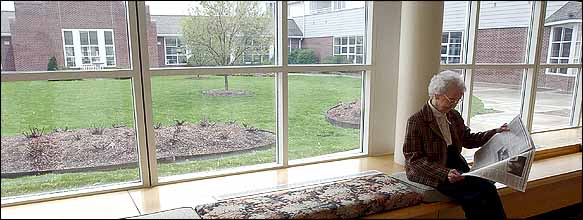
back
Support Global Action on
Aging!

Thanks!
|
 |
Grandparents
Are Returning to College, to Retire
By
Karen Alexander, The
New York Times
May 12, 2003

Stephen D. Cannerelli for The New York Times
Nellie
Corson lives at the Kendal retirement center in Ithaca, N.Y., which has
ties to Cornell University and Ithaca College.
Most retirement communities are loaded with recreational and social
activities. But what if retirees long for some intellectual invigoration?
Some of these people are returning to college — or, rather, choosing to
live in a growing number of developments built for older people and
situated on or near campuses.
College-linked retirement communities, as they are called, are
available at 60 campuses nationwide, including the University of Michigan,
the Ivy League members Cornell and Dartmouth, and even smaller schools
like Lasell College, in the Boston suburb of Newton. Experts say these
communities, where residents can buy or rent their homes, will become more
commonplace over the next two decades, as many of the nation's estimated
76 million baby boomers reach retirement age.
At best, they will satisfy the baby boomers' increasing appetite for
lifelong education, said Marc Freedman, author of "Prime Time: How
the Baby Boomers Will Revolutionize Retirement and Transform America"
(Public Affairs, 2002). "At the very least, it could just turn out to
be a revenue generator for universities and a pleasant way for older
people to while away their waning days," he said.
In some cases, the retirement communities are run by large developers.
One is the Kendal Corporation, a nonprofit charitable organization in
Kennett Square, Pa., that operates units near Dartmouth, Oberlin College,
and near the campuses of Washington and Lee University and the Virginia
Military Institute. A Kendal project under development in Granville, Ohio,
will have ties to Denison University, and a planned development in Sleepy
Hollow, N.Y., is exploring a possible link to a local college.
The Hyatt Corporation plans to break ground in late spring on the
Classic Residence by Hyatt, on 22 acres near Stanford in Palo Alto,
Calif.; already, 307 of the 388 units, which cost $600,000 to $3.9
million, plus monthly fees, are spoken for. The development will offer
various levels of care, including 44 suites with an around-the-clock
nursing staff.
The retirement communities usually have an affiliation with the school,
and the residents often include alumni and former faculty members. Some
retirement communities have informal ties, while others offer their
residents access to university health care services and gerontology
experts, the opportunity to attend classes and cultural events on campus
and the chance to learn and live practically side by side with energetic
college students.
"It's an affinity group," Ronald J. Manheimer, the executive
director of the North Carolina Center for Creative Retirement at the
University of North Carolina at Asheville, said of the residents.
"They are people who hold lifelong education in high esteem; the life
of the mind is important to them," added Mr. Manheimer, who has
studied college-linked retirement communities.
But the campuses also benefit. At the 92-unit University Commons at the
University of Michigan, residents attend football games together and often
entertain dinner speakers from the university. Graduate students from the
School of Music often perform their required concerts and recitals in
front of an audience of University Commons retirees.
"They like an audience and we can always provide one," said
Robben W. Fleming, a resident and a former president of the university,
from 1968 to 1979, and on an interim basis in 1988.
Students, too, enjoy the interaction. When Jennifer Edwards, 21,
graduates from Lasell College this spring, she said, she will miss her job
as a dining hall manager at Lasell Village, the retirement community. Ms.
Edwards, a fashion design major, said she had received support and advice
on her senior project from her retiree friends, including a former fashion
designer.
"You come to college expecting to be with your peers for four
years, but when they threw in the village, it turned out to be so much
fun," she said. "They love us; we love them. They know when
things are wrong, and they tell you: `Look, you'll be fine. Look at how I
made it.' "
Copyright
© 2002 Global Action on Aging
Terms of Use | Privacy
Policy | Contact Us
|



